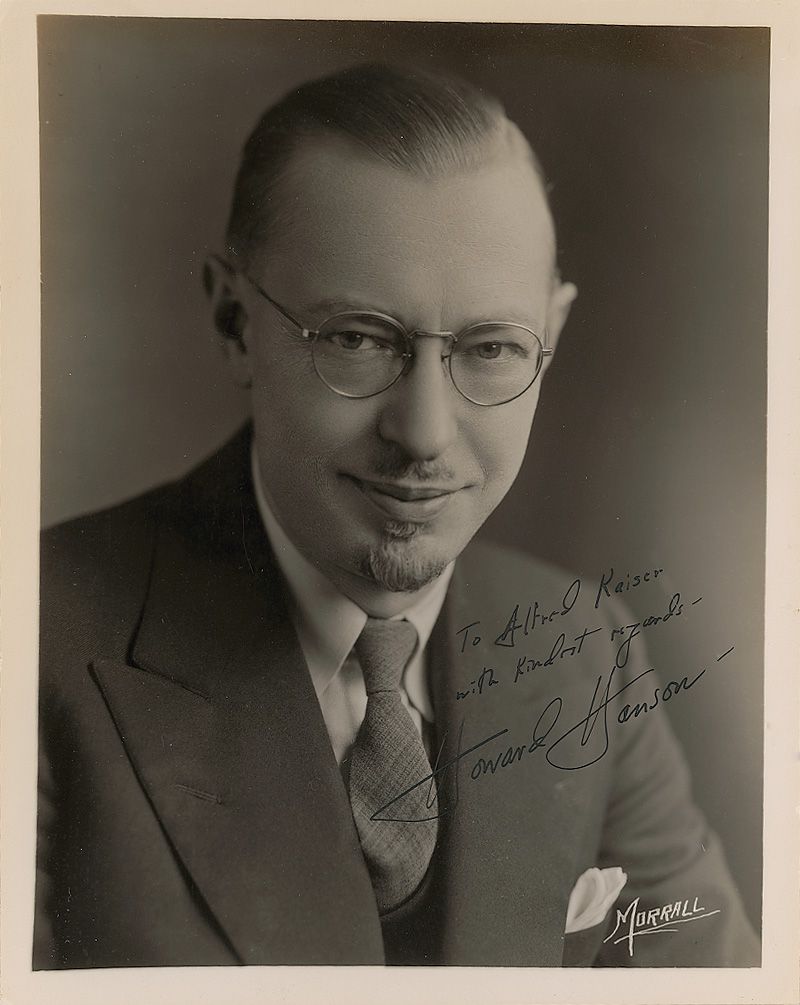Hanson’s neglected “Merry Mount” receives a thrilling performance from Christie, Rochester Philharmonic

Howard Hanson’s opera “Merry Mount” was presented by conductor Michael Christie, soloists and the Rochester Philharmonic Wednesday night at Carnegie Hall.
A rare concert revival of Howard Hanson’s opera Merry Mount brought the Rochester Philharmonic Orchestra to Carnegie Hall Wednesday night as part of the “Spring for Music” series.
Now in its fourth and final season, “Spring for Music” has fallen victim to a lack of funding. It’s New York’s loss, as this excellent program has allowed orchestras from all over North America to come to Carnegie’s stage and show us just how much we’ve been missing.
It was altogether fitting that the Rochester Philharmonic paid homage to Hanson, who was the director of that city’s Eastman School of Music for over forty years. Once one of America’s best-known composers, Hanson seems to have been nearly forgotten since the heady days when he was conducting his symphonies for Mercury Records’ “Living Presence” series in the 1950s. He’s overdue for serious reconsideration. While his lush, tonal style may not fit all contemporary tastes, there is no denying the power, emotional pull, and melodic appeal of his music.
Those familiar with his symphonies will find that Merry Mount shares the same distinct musical profile; Hanson’s sensuous sound is very much his own. Inspired—though not specifically based on—a story by Nathaniel Hawthorne, the opera has a strange, imbalanced libretto by Richard L. Stokes chock-full of intentionally archaic dialogue. The proceedings are dominated by the baritone lead and the massive chorus, with other characters left little stage time to make an adequate impression.
Like an American Franz Schreker, Hanson focused on the struggle between carnality and spirituality in a repressive, faith-based society. The action is set in a Puritan colony in seventeenth-century New England ruled by the iron hand of the young reverend Wrestling Bradford. Bradford, tormented by erotic dreams of the demon temptress Astoreth, meets his match when Astoreth appears personified in the form of a young British noblewoman, Lady Marigold Sandys, newly arrived in America with a group of Cavaliers dedicated to pleasure and sensuality. The action, which takes place in a single day, includes Bradford’s feverish dream of an erotically charged Hell, as well as plenty of brutal and violent events including an Indian chief who takes a bullet to the head and a young Cavalier who is speared with a lance. It all ends in a massive conflagration and the murder-suicide of Bradford and Lady Marigold as Bradford sweeps her up and carries her into a burning church.
Merry Mount was first presented in concert form by the Chicago Symphony Orchestra in Ann Arbor in 1933, but it was commissioned by the Metropolitan Opera, where it received its stage premiere on February 10, 1934. That Saturday afternoon broadcast survives on CD, with Lawrence Tibbett giving an intensely theatrical performance under the baton of Tullio Serafin. The audience response was enthusiastic; the critics were not as impressed. After a total of nine performances, the Met let Merry Mount slip out of its repertoire. The work has barely been heard since then, although a 1996 concert version by the Seattle Symphony Orchestra, rather flaccidly conducted by Gerard Schwarz, was recorded and released on CD.
At Carnegie Hall, Michael Christie and the Rochester Philharmonic showed just how thrilling this opera can be. Aided by the superb singing of the Eastman Rochester Chorus and the Bach Children’s Chorus of Nazareth College, as well as a committed cast of soloists, they sent out enormous waves of sound that shook the rafters yet never seemed like empty bombast. Hanson’s opera emerged as a galvanizing, gorgeous, and brutal work, at times recalling some of the great mid-twentieth-century film scores of Alfred Newman and Franz Waxman. But with its awkward libretto and its numerous, lengthy choral passages, its true home may be the concert hall and not the opera house.
Richard Zeller, who sang Bradford in the 1996 Seattle concerts, repeated the role here. He was valiantly going up against the ghost of Lawrence Tibbett, but the baritone came up short on that kind of charisma and vocal personality. Nonetheless, he gave a heartfelt performance in this taxing role, and his words came through with clarity.
As Lady Marigold, soprano Sara Jakubiak unfurled a lovely voice with a particularly strong top; she made one regret that Hanson had not given her more to sing. Tenor Christopher Pfund, as her fiancé Sir Gower Lackland, was overparted; he strained to sing over the large orchestra and his upper register sounded highly taxed.
Charles Robert Austin used his authoritative bass and granitic presence effectively as the sanctimonious elder who is literally named Praise-God Tewke. Creating a memorable character with very limited stage time was tenor Anthony Webb as the British jester Jack Prence. Matthew Valverde, also with only a couple of lines to sing, displayed a huge, handsome tenor that holds promise of bigger things to come.



Posted May 11, 2014 at 10:17 am by Major Frank L. Laifer
Attended the 7 May Carnegie Hall Performance. The music was superb, espcially in the second Act. Up ’till now, my favorite Hanson work was his First Symphony but, God!!!…that wonderful second act of Merry Mount!!!!
Posted May 15, 2014 at 12:39 pm by Ken Samarra
Bravo to the Bach Children’s Chorus for a spectacular performance. Their piece was definitely a highlight of the opera.
Posted Jul 30, 2015 at 2:13 pm by James Friedland
It’s more than a year later but I’ll post this anyway and everywhere —
The great Andrew of Pristineclassical.com released last year a 1955 recording of Howard Hanson’s own conducted performance of ‘Merry Mount’ in the usual extraordinary condition. It’s here — along with quite a few Hanson recordings which weren’t revived by Mercury.
https://www.pristineclassical.com/paco108.html